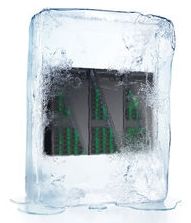MIT successfully reconstructed audio from the video of minute vibrations of a potato chip bag.
This could represent a whole new method of surveillance.
MIT successfully reconstructed audio from the video of minute vibrations of a potato chip bag.
This could represent a whole new method of surveillance.

“There may well be approaches that don’t require Apple to build a custom firmware to defeat some of the iPhone’s security measures.”


Let’s just hypothesize a little on this topic: let’s say Apple goes ahead and gives in to the US Government and enables government to access the phone’s info. Does Apple have any protection in the future from lawsuits from it’s customers in situations where their own customers information is hacked by criminals and published to the world or used for illegal activities? Because I do see in the future more lawsuits coming at the tech companies for not ensuring their platforms and devices are un-hackable. So, if the government has its way; what protections does tech have now with any future lawsuits by consumers and other businesses?
His comments come during the ongoing legal battle over an iPhone used by Syed Farook, one of the individuals responsible for the San Bernardino, Calif. mass shooting December 2. “I don’t think requiring backdoors with encryption is either going to be an effective way to increase security or is really the right thing to do for just the direction that the world is going to”.
This is because First Amendment treats computer code as speech and according to Apple, meeting the demands of the government would be equivalent to “compelled speech and viewpoint discrimination”.
The Electronics Frontier Foundation (EFF) has said it will be filing an amicus brief in support of Apple with the courts.

This could be very very tricky for a number of reasons: 1) how will this work with people who develop laryngitis or some other illness disrupting their speech? 2) what happens if a person uses a recorded voice or voice changer? 3) what happens when a person’s voice does change as they get older or have a medical procedure done that permanently alters the voice? I could list more; however, I believe that researcher will realize that there will be a need for two forms of biometrics when it comes to the voice.
Software firm Nuance believes that in the near future, there will be an expectation from customers to interact with technology in a more human-like manner.

Reminder to everyone who loves hearing about what NextGen Technologies that US Government has been working on: March 11th, US IARPA is hosting a conference on “Odin” (detection technologies to ensure biometric security systems can detect when someone is attempting to disguise their biometric identity.)
The Intelligence Advanced Research Projects Activity plans to hold a conference related to a biometric presentation attack detection programme called Odin.
The conference, to be held on 11 March in Washington, will be to provide information on Odin and the research problems the program aims to address, the agency noted.
The goal of the Odin programme is to develop biometric presentation attack detection technologies to ensure biometric security systems can detect when someone is attempting to disguise their biometric identity.

Portland computer science research company Galois snagged a $6.2 million grant from the Department of Defense for a project that, if successful, could make the current battle between the FBI and tech giant Apple obsolete.
The three-year research contract comes from the Defense Advanced Research Projects Agency and will fund research into quantifying privacy preservation systems.
‘Can you quantify how private a system is or isn’t and can you make a judgment about it,’ said Galois CEO Rob Wiltbank,…


The biometric security methods for online transactions have been in trials by MasterCard since last July and are being expanded around the world.
MasterCard is planning to launch fingerprint and selfie biometric identification options for customers in the United States and in other parts of the world this summer as it finds that users are comfortable and confident with the technology.
The expansion of the program, which began last July as a trial project to see how consumers would respond to the use of selfies and fingerprints to replace passwords for their online purchases, was announced by the company on Feb. 22 in Amsterdam, where a larger testing project involving some 750 users over six months was also conducted.